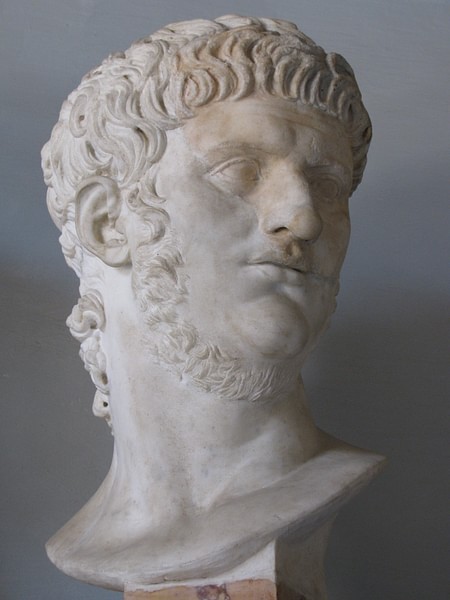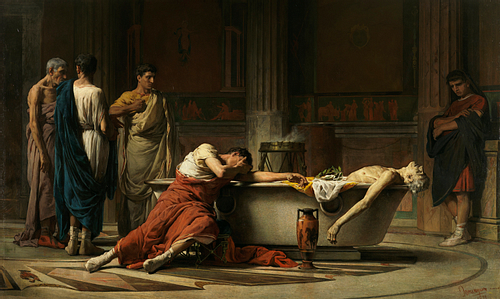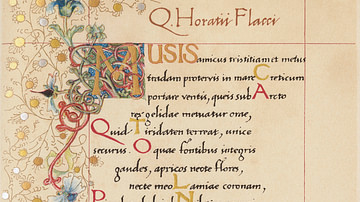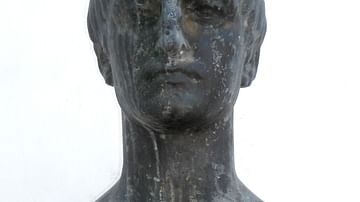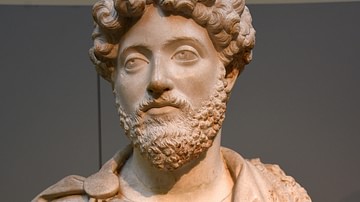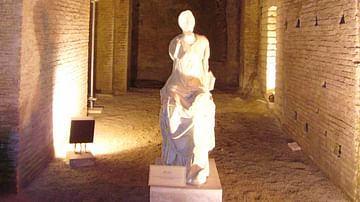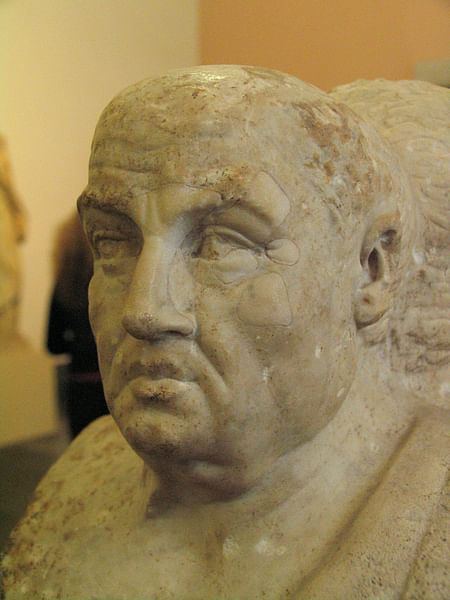
Lucius Annaeus Seneca (Seneca the Younger, l. 4 BCE - 65 CE) was a Roman author, playwright, orator, and most importantly a tutor and advisor to the Roman emperor Nero (r. 54-68 CE). Influenced by Stoic philosophy, he wrote several philosophical treatises and 124 letters on moral issues, the Epistulae Morales (Moral Epistles). As Nero's tutor, he tried to pass on his philosophy of a virtuous life, and with the help of the prefect of the Pretorian Guard, Burrus, he tried to keep Nero's indulgences under control. Despite his best efforts and falsely accused of being part of a plot to assassinate the emperor, he was ordered to commit suicide by the increasingly paranoid Nero.
Early Life & Exile
Born in Cordoba, Hispania (Spain) in 4 BCE, Seneca came from a wealthy family of Italian stock, which automatically made him a Roman citizen. He had two brothers, a mother, Helvia, and a famous father, Seneca the Elder, an author and teacher of rhetoric. Seneca spent his formative years studying both grammar and rhetoric in Rome, and while there, he developed a life-long interest in philosophy, attending lectures on Stoicism, a Greek philosophy befitting his character and evident throughout his treatises. According to one of its proponents, Epictetus, one must live a life of tranquillity, serenity, and composure, and peace of mind can be achieved through self-control.
Always of ill health, Seneca traveled to Egypt to live with his aunt, returning to Rome in 31 CE. It was after his return to the city that he gained a reputation as an orator, eventually becoming a quaestor. Unfortunately, he ran afoul of the emperors Caligula (r. 37-41 CE) and Claudius (r. 41-54 CE). He was supposedly implicated in an adulterous affair with Julia Luvilla, the younger sister of Caligula, and was banished to Corsica in 41 CE. However, while in exile he did not sit idly, he continued his study of philosophy and wrote a series of treatises.
In 49 CE, he was recalled to Rome through the influence of Agrippina the Younger, Caligula's sister and mother of the future Roman emperor Nero. In his book The Annals of Imperial Rome, Tacitus wrote of his return:
So she now secured the recall of Lucius Annaeus Seneca from exile and his appointment to a praetorship. She judged that owing to his literary eminence this would be popular. She also had designs on him as a distinguished tutor for her young son Lucius Domitius Ahenobarbus (Nero). Seneca's advice could serve their plans for supremacy…. (255)
Tacitus added that she believed he would be devoted to her - owing to his recall - and hostile to her husband, Claudius, who had exiled him. Secure in his position as a tutor and advisor to the future emperor, Seneca married Pompeia Paulina. It was also at this time that he became close friends with the prefect of the Pretorian Guard, Sextus Afranius Burrus. It was a friendship that would eventually benefit them both. Tacitus called them “partners in power.”
Nero's Tutor & Advisor
When young Nero turned twelve, Seneca took over his duties as Nero's tutor, and with Burrus as his ally, they became the young emperor's advisors, attempting to control his indulgences and teach him how to rule wisely. Both were extremely influential on the young would-be emperor but by totally different methods. Tacitus wrote that Burrus' strength lay in his “seriousness of character” and efficiency while Seneca was a man of high principles.
They collaborated in controlling the emperor's perilous adolescence; their policy was to direct his deviations from virtue into licensed channels of indulgence. Agrippina's violence, inflamed by all the passions of ill-gotten tyranny, encountered their united opposition. (285)
Aside from writing Nero's speeches, Seneca would teach his young protégé philosophy and literature with the hope that these subjects would guide him into practicing good government. The famed orator would also arouse in him a love of both music and the theatre; something his peers would one day regret. One curious note on Seneca's definition of good government: the emperor would have to tolerate the animosity of those around him. One must know the difference between a good emperor and a tyrant.
History has shown that Nero did not listen to his teacher's advice. Finally, upon the death of Emperor Claudius in 54 CE, Nero took the throne at the tender age of 17. Regrettably, at least for the emperor, his power would not be his alone, for his mother believed that her influence would continue. She would soon learn that it was not to be. Her death would change everything not only for Nero but also for Seneca and Burrus. Nero was now free to be whomever he wished and to fulfill his inner desires.
After his mother's death, Nero sent a letter to the Roman Senate condemning her, accusing Agrippina, among other things, of plotting to kill him. According to the letter, her death was “providential.”
The Senate, of course, did not accept the accusations of the emperor, and according to Tacitus, the “condemnation fell not on Nero, whose monstrous conduct beggared criticism, but on Seneca who had composed his self-incriminating speech” (318). Sadly, the incident tarnished the orator's reputation, and things would only get worse. In 62 CE Burrus died, supposedly, according to Roman historian Suetonius, by poison, leaving Seneca to question his own fate. He soon realized that his influence on Nero was waning. Gradually, he withdrew from public life, devoting himself to writing treatises on Stoic philosophy. Implicated in the Piso conspiracy to assassinate the emperor, Seneca was ordered to commit suicide. In his The Twelve Caesars, Suetonius wrote:
When his teacher Seneca repeatedly asked to leave to retire and had surrendered all his estates, Nero swore he had no cause to suspect the old man, whom he would rather die than harm; but he drove him to commit suicide nevertheless. (229)
Death
Owing to his strong Stoic beliefs, Seneca died with dignity in 65 CE. Seneca had learned from the teachings of the Greek philosopher Epicurus that one should not fear death. As the day arrived, he spoke to his friends and embraced his wife. She had planned to die with him but Nero gave orders to stop her. His death would not come easily. He slit the arteries in his arms but, owing to his frugal diet and fragile frame, he did not die. He drank poison - as did the famed Greek philosopher Socrates - and was then placed in a hot bath where he was suffocated by the steam.
His body was interred without burial rites. According to Tacitus:
…Seneca's aged body, lean from austere living, released the blood too slowly. So he also severed the veins in his ankles and behind his knees. Exhausted by severe pain, he was afraid of weakening his wife's endurance by betraying his agony —- or of losing his own self-possession… (376)
Works & Philosophy
Although some are lost, his writings have endured through the ages and influenced countless philosophers and authors of prose and poetry. Most forget that he was a playwright as well as a philosopher. His nine plays - often referred to as “closet” tragedies - dealt with heroes of Greek mythology such as Herakles (Hercules in Roman mythology), Oedipus, and Medea.
Most of his treatises were written as ethical dialogs often to his good friend Lucilius. His most important works include:
- Epistulae Morales (Moral Epistles) – the longest of his prose works written around 65 CE, which includes 124 brief sermons in 20 books, covering a variety of topics from vegetarianism to the humane treatment of slaves
- De Vita Beata – on how to live a happy life.
- De Beneficiis – a treatise on the Roman social code
- De Tranquillitate Animi – on the tranquility of mind
- De Brevitate Vitae – on the brevity of life
- De Consolatione ad Polybium – written to Claudius' freedman with the hope of using his influence to be recalled from exile
- De Consolatione ad Helviam – written to his mother Helvia during his time in exile
- De Clementia – on mercy, written to Nero advising him to practice virtue
- De Ira – on anger
- De Consolatione ad Marciam – Stoic teachings to a woman on the death of her son
- De Providentia – on providence
- De Constantia Sapientis – essay embracing the inner strength of a wise man
- De Otio – on leisure
Death was a prominent theme in many of his writings, and throughout his letters, he promoted his Stoic beliefs. To Seneca death was liberating, part of the natural cycle of life: “It is folly to die from the fear of death.” (Romm, 77) In his Moral Epistles, he wrote to Lucilius:
Those who have learned how to die have unlearned how to be slaves. It is a power above and beyond all other powers….There's only one chain that holds us in bondage, the love of life. (2 -3)
Seneca suffered from a respiratory condition throughout his life and even contemplated suicide. To him, if a person believed there was little hope, suicide was a possible answer. “… if one's body becomes useless for performing its functions, is it not fitting to draw the struggling mind out of it?” (72) However, he would not end his own life because of illness if there was a cure, but he would consider it if he lost his mind and had only breath. He added, “Do you think there is anything crueler to lose from life than the right to end it?” (73)
In a letter addressed to Marcia (De Consolatione ad Marciam), he wrote:
Death is the undoing of all our sorrows, an end beyond which our ills cannot go; it returns us to that peace in which we reposed before we were born. (13)
If a person pities the dead then that person must also pity the unborn. One must know how to die well. No one goes cheerfully except those who have prepared. He wrote to Lucillius speaking of his own preparation:
As for myself, I wouldn't refuse the addition of more years. But I will say that I lacked nothing that would render that life happy…I regard every day as though it were my last. (49)
Seneca lived and died adhering to his strong Stoic principles. Dying with dignity, he did not fear death. It was a part of the natural cycle of life.
Legacy
Seneca's treatises espouse his views on how a person ought to be, living a life of tranquility, serenity, and composure. As a tutor and advisor to the young Emperor Nero, he tried to pass on his philosophy of a virtuous life; be a good leader, not a tyrant. Unfortunately, his teaching fell on deaf ears. After the death of Agrippina, Nero was free to do as he wished and became the despot Seneca had hoped to prevent. Although not part of the Piso conspiracy to assassinate Nero, Seneca's days were numbered. The paranoid emperor who saw conspiracies everywhere was cleaning house, and his old tutor became a victim. Fortunately, Seneca's letters have endured. They have influenced countless generations of writers.
